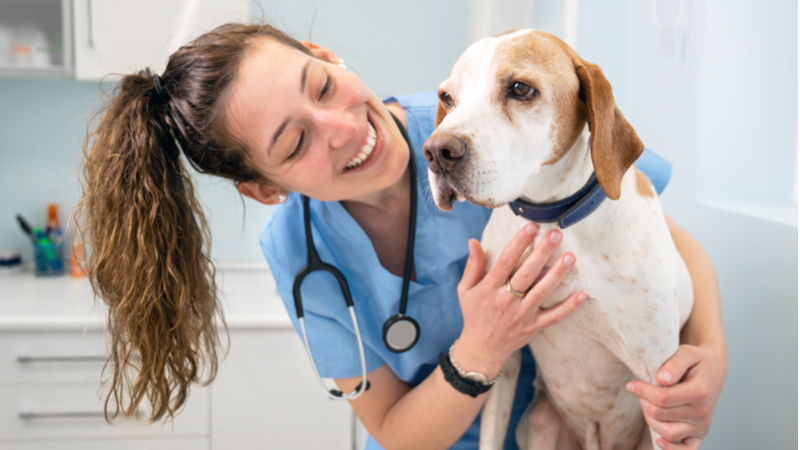Here’s some good news for pet owners: high-quality veterinary care, including procedures like MRIs and hip replacements, is now readily available for pets.
Your primary veterinarian can provide you with access to trusted, specialized medical professionals, steering you in the right direction to ensure that each decision enhances your pet’s quality of life.
Here’s an explanation of what a veterinary speciality is and a brief overview of some of the services now available for pets.
What Is a Veterinary Specialty?
You’re probably familiar with the structure of human medical care. If you have a health concern, you visit your general practitioner, and if needed, they refer you to a specialist. It’s the same process in veterinary care.
Just as human doctors can seek additional education in a specialized field, so can veterinarians. A veterinary specialist selects an additional 3-5 years of training in their chosen field, with options ranging from neuroscience to ophthalmology.
In a 2015 report from the American Veterinary Medical Association (AVMA), over 11,000 veterinarians in the U.S. were identified as board-certified specialists in one of 40 specialty animal medicine areas. That’s a lot of specialization and more opportunities to help your pet live well, and the number of specialists are on the rise.
5 Veterinary Service Trends You Need to Know About
Dr. Debra Eldredge, a veterinarian at SeniorTailWaggers.com, says she most often refers pet owners to veterinary ophthalmologists, veterinary oncologists (a subset of veterinary internal medicine), and veterinary surgeons. Her background in patient care earned her the first Gentle Doctor Award, a prize given by Cornell University’s clinical faculty for the best patient care.
Ophthalmology
Specialized eye care is gaining popularity because dogs are prone to cataracts, glaucoma, and other eye problems. Veterinary ophthalmologists deal with vision and the diagnosis and treatment of all eye disorders. Because of the highly technical nature of performing eye surgeries, these specialists have their own regulatory body, and the American College of Veterinary Ophthalmologists oversees them.
Dr. Eldredge says, “I use ophthalmologists to do hereditary eye disease screenings for my dogs and for client dogs. Also, if a dog needs cataract surgery, these are the people to do it.”
Oncology
It’s no secret that cancer is on the rise in dogs and cats. According to the Veterinary Cancer Society, cancer is the leading cause of death in 47% of dogs over 10.
As a result, some veterinarians offer chemotherapy and other treatments for cancer. Dr. Eldredge says, “Veterinary oncology is a very fast developing science. It is difficult for a veterinarian in general practice to stay on top of all the advances. In addition, veterinary oncologists have access to, and are often involved in, clinical trials that can be beneficial to many patients.”
Specialized Surgeries
Hip replacements, torn ACLs, eye surgery... The list goes on of potential canine surgeries available for today’s pups. No general practitioner would attempt to do a surgery themselves. Instead, they’d refer you to a specialist experienced in the procedure.
Dermatology
Another up-and-coming trend in the veterinary world relates to skin conditions. A veterinary dermatologist will zero in on diagnosing and treating all allergies, as well as skin, hair, ear, and nail problems.
If your pet constantly scratches (but your primary vet can’t seem to figure out the root cause), it might be a good idea to consult a dermatologist. They have specialized equipment to test for skin conditions on a bacterial level.
Radiology
Last on our list of specialty veterinary services is radiology. A veterinary radiologist focuses on diagnostic imaging, which means they interpret x-rays, CT scans, and ultrasounds. These veterinarians train to use cutting-edge technological equipment that a primary care veterinarian might not be able to access.
The Future Is Bright for Pet Healthcare
Just like people have their general practitioners who refer them to specialists for further investigation as needed, today’s advanced veterinary care offers the same options.
With the right guidance and referrals, your pet can have top-notch health care that wasn’t even available a few years ago. As your pet’s health advocate, you can learn all you can and ask your primary veterinarian for more suggestions and referrals if needed.
Of course, you may be concerned about the cost of specialty veterinary care. Protect your pet’s health and your pocketbook with AKC Pet Insurance (underwritten by Independence American Insurance Company). Accident and Illness Coverage and optional Exam Coverage can provide peace of mind for unexpected emergencies. Click here to get a quote or call us at 866-725-2747 to discover if pet insurance is right for you and your pup!


